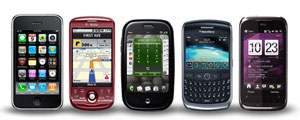
CELLPHONES are becoming ubiquitous, even in underdeveloped countries.
Report By Discovery Tech
This unprecedented penetration by a communications technology is clearly changing the face of the developing world for the better — in some cases, in ways that not even the most visionary leaders anticipated.
This mass proliferation of mobile phones is improving the quality of life for impoverished people in multiple ways. Aside from the obvious advantage of facilitating communication, access to this technology is increasing income, improving health and safety, making life more convenient, and increasing the GDP of entire countries.
Here is the top 10 list of what the technology does for people living in developing nations:
Improves profits for farmers and business owners
Instead of having to depend on a middleman to determine what price to sell, say, bananas, chickens, or some other commodity, farmers can now use a cellphone to call the market and get a price. This improved market information increases profits and avoids reliance on unscrupulous middlemen who might take advantage of struggling suppliers. Facilitates a consumer society
Haitians who have access to motor vehicles can call ahead to check on product availability, rather than spending $13 a gallon on gas to make a three-hour trip to town, only to find that the item they needed is not there.
- Chamisa under fire over US$120K donation
- Mavhunga puts DeMbare into Chibuku quarterfinals
- Pension funds bet on Cabora Bassa oilfields
- Councils defy govt fire tender directive
Keep Reading
Provides less expensive access to communication
Those who cannot afford landlines can opt for mobile phones with prepay cards or use the cell phone service provided by local Internet cafes or vendors who sell their personal cell phone minutes to others.
Because in many poor countries, the wait for a prohibitively expensive land line can take years and may even require political connections, mobile phones have greatly expanded access to phone technology. Replaces the Internet for those who cannot afford computers
People in developing countries around the world now rely on text messaging on their mobiles to stay in touch. People who do not have access to desktop or laptop computers simply use text messages to stay in touch or access a wide variety of data services, including financial transactions, news and market price updates.
Makes banking services accessible
In Kenya, owners of tiny, mom-and-pop businesses who don’t have access to commercial banking can gain access to credit via cellphones.
There is no monthly fee — people only pay for transactions they execute. In a number of other countries, cell phones are being used to pay electricity bills by texting the appropriate information.
Circumvents the frustrations of other infrastructure
Cellphone service is even more necessary and more useful in undeveloped countries because the condition of the rest of the infrastructure is so poor. For instance, as the cost of building highways has gone up, the cost of phone service is decreasing, making it easier to enhance the telecommunications sector even when other infrastructure projects are out of reach.
Improves public health
In South Africa, mobile phones are used also to combat epidemics such as AIDS or malaria. Patients can access doctors or national AIDS hotlines and receive text messages highlighting numbers to call for medicines and to arrange for testing. Nurses also text-message tuberculosis and AIDS patients to remind them to take their medication, thereby boosting recovery rates of patients and reducing financial costs and the burden on the public healthcare system as a whole. Boosts national productivity
An oft-quoted 2005 study from the London Business School found that when 10 more people out of 100 in developing countries start using cellphones, the GDP rises by 59% per capita. Some studies have found an even higher rise in GDP. 9. Helps vulnerable populations cope with natural disasters When there is a disaster or flood, the usage of telephones goes up in the affected areas. People try to help each other out or communicate for help.
Creates new jobs and business opportunities
In developing countries, said Toure, job creation in the mobile industry has been second to none, from people making a living by using cell phones to sell cars on the street to large corporations creating jobs for cell phone engineers. “Mobile phone vendors in Legos, Nigeria, are enabling people to make phone calls, and they’re making money out of it,” he said. “Sometimes it’s a small [amount], but they make a living at it, and they’re not begging in the street anymore, and that’s what counts.”— Discovery Tech











